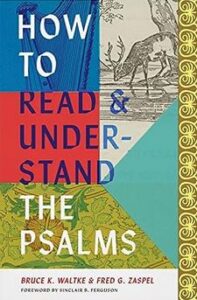September Book Review: How to Read and Understand the Psalms
 Note: I was provided a free copy of this book in exchange for an honest review. (My affiliate link for an Amazon product is included in the post. As an Amazon Associate, I earn from qualifying purchases.)
Note: I was provided a free copy of this book in exchange for an honest review. (My affiliate link for an Amazon product is included in the post. As an Amazon Associate, I earn from qualifying purchases.)
Watke and Zaspel are excellent scholars, but not all scholars can write for a general audience in an understandable and accessible manner. I am pleased to say that although these two scholars have a wealth of knowledge about the Psalms that would likely send me rushing for my dictionary and googling obscure terms, it wasn’t necessary.
Step by step, the authors take the readers through the Psalter in a logical and helpful manner–shedding light not only on their “take” of each Psalm but also reviewing the scholarly debates on issues such as Davidic authorship and Messianic interpretations. Although no book stands alone, I would very much recommend this to anyone who is wanting to dive deeper into the subject without having to become bogged down in scholarly rhetoric which can be incredibly confusing to anyone who is new to learning the ins and outs of Biblical Scholarship.
For example, in the lead in chapter to the discussion of Psalm 3, the authors delve into the debate over the authorship of the Davidic Psalms and make the case for the legitimacy of the claims through discussion of the story of David and Absalom, what we do and do not see in books 1 and 2 of the Psalter in terms of post-Davidic authorship, and a fair assessment of the arguments against David as the psalmist. Individual psalms provide an opportunity for different lessons and the introduction of various scholarly debates. I found this thoroughly enjoyable.
In short, How to Read and Understand the Psalms is a welcome addition to my growing bookshelf concerning the “much deeper than they seem” wisdom sayings, royal psalms, laments, hymns, praises, thanksgiving, confidence psalms, and even the dreaded imprecatory psalms (you know, the ones about dashing babies against rocks that we all wish weren’t there).